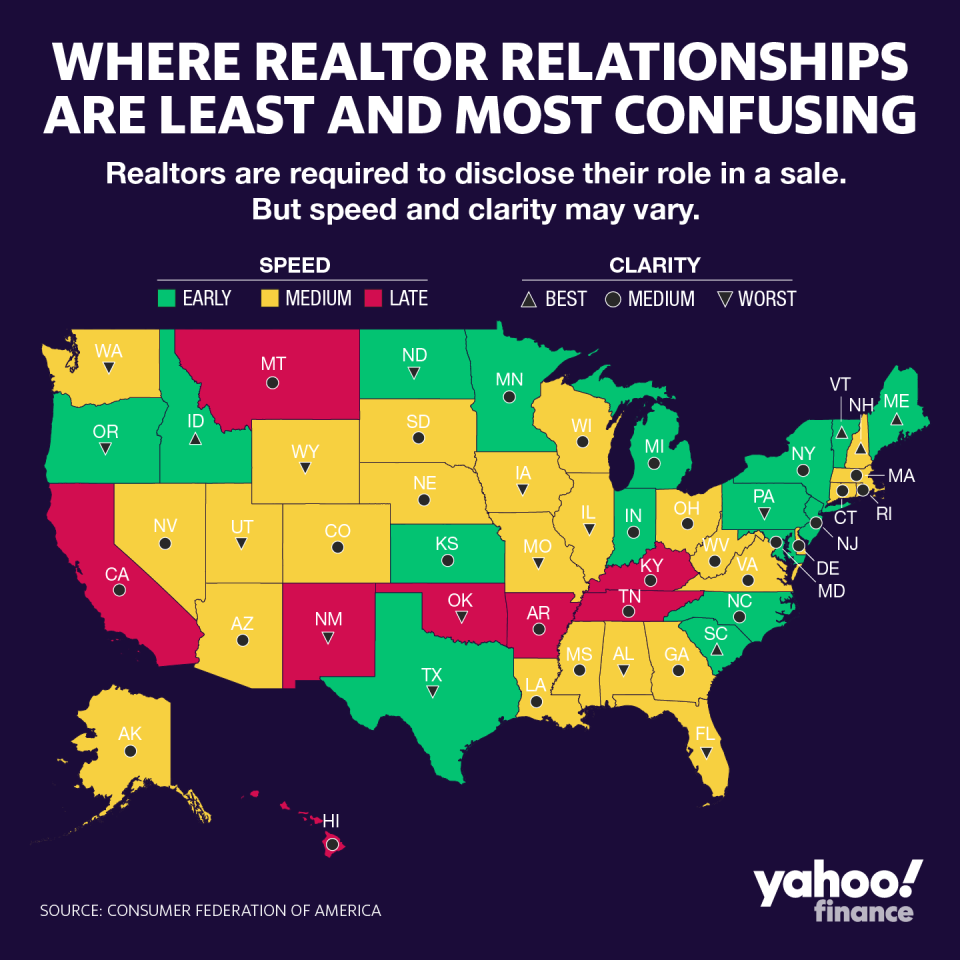How well you know your realtor may depend on which state you live in
Working with a real estate agent does not make the broker your real estate agent.
Brokers are legally required to disclose whose interests they represent, but disclosure forms are often insufficient, coming to your attention too late with little clarity, depending on the state, according to a new report by the Consumer Federation of America.
Some states like South Carolina, Vermont, Maine and Idaho require clear disclosures at the first meeting between a realtor and homebuyer or seller, but others like New Mexico, Oklahoma and Washington have slow, obscure disclosure procedures, the report said

Broker-consumer relationships are complex. A seller’s agent works with potential buyers on a sale, but they represent the seller’s interests. An agent may represent both or neither parties, and their role may change.
But two-thirds of American adults do not know that real estate agents are not always required to represent the interests of the homebuyer or seller with whom they are working, according to an October 2018 national survey commissioned by the CFA.
“Not knowing whether your real estate agent represents your interests or those of the other party can be costly,” said Stephen Brobeck, a senior fellow at CFA and author of the report.
Timely disclosure
The report alleged that disclosures often do not happen early enough in the broker-consumer relationship. Nationally, 27% of recent homebuyers said they received the disclosure or were aware they had at the first contact, while 23% did not receive a disclosure until the sales contract was written, according to a 2019 National Association of Realtors report.

“If during the first communication between buyer and agent, the agent fails to inform the consumer about lack of confidentiality, the consumer may disclose what they can afford or be prepared to spend on a home, and that information could be passed on to the seller,” said the report.
Only 16 states require disclosures at the beginning of the broker-consumer relationship. Some states, like California, require a disclosure late in the process, only, “before entering an offer to purchase” or “before signing of sale contract,” in Arkansas
Complex and incomplete information
In fact, many homebuyers never read the disclosure. Some 40% of recent homebuyers did not receive or were not aware they received a disclosure, according to a 2019 National Association of Realtors (NAR) report.
“Few agents make it clear to the seller or buyer what their obligations are related to this [agency disclosure] document. They simply tell the buyer and the seller it is a required document they must sign before they can assist them in a transaction,” said Arizona RE/MAX broker Drew Seargent, who was quoted in the report.
The CFA report also took issue with complex, legal language in disclosure forms. Washington state’s disclosure form was deemed to be the least consumer friendly in the country, while Delaware and Wyoming were also called out for unclear disclosure forms.
The most important information in a disclosure, whether the agent represents the buyer or the seller, is in most cases shown in a check box on the form. But 14 states (Alabama, Florida, Illinois, Iowa, Missouri, North Dakota, New Mexico, Oklahoma, Oregon, Pennsylvania, Texas, Utah, Washington and Wyoming) do not clearly identify whom the agent represents, according to the report.
The report comes after another condemning report by the CFA in October. Over the last year, there has been increased scrutiny around transparency in the home buying process, including a class action anti-trust lawsuit against the National Association of Realtors challenging the practice of split commissions. The U.S. Department of Justice is also investigating CoreLogic MLS data, with concerns surrounding commission price competition and negotiability.
The NAR did not respond to a request for comment.
Sarah Paynter is a reporter at Yahoo Finance. Follow her on Twitter @sarahapaynter
Read the latest financial and business news from Yahoo Finance
Follow Yahoo Finance on Twitter, Facebook, Instagram, Flipboard, SmartNews, LinkedIn, YouTube, and Reddit.
More from Sarah:
Real estate brokers ‘purposely’ hide commissions: study
What to expect from the housing market in 2020
Early-bird home buyers turn January into the new April: Realtor.com


